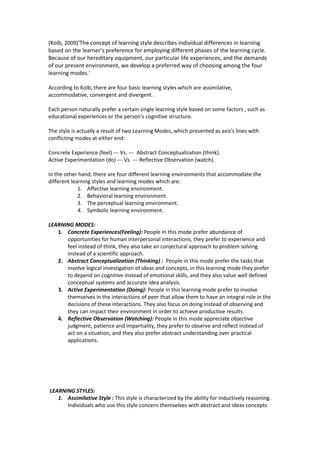
learning styles
- 1. (Kolb, 2009)'The concept of learning style describes individual differences in learning based on the learner’s preference for employing different phases of the learning cycle. Because of our hereditary equipment, our particular life experiences, and the demands of our present environment, we develop a preferred way of choosing among the four learning modes.' According to Kolb, there are four basic learning styles which are assimilative, accommodative, convergent and divergent Each person naturally prefer a certain single learning style based on some factors , such as educational experiences or the person's cognitive structure. The style is actually a result of two Learning Modes, which presented as axis's lines with conflicting modes at either end: Concrete Experience (feel) --- Vs. --- Abstract Conceptualization (think). Active Experimentation (do) --- Vs. --- Reflective Observation (watch). In the other hand, there are four different learning environments that accommodate the different learning styles and learning modes which are: 1. Affective learning environment. 2. Behavioral learning environment. 3. The perceptual learning environment. 4. Symbolic learning environment. LEARNING MODES: 1. Concrete Experiences(Feeling): People In this mode prefer abundance of opportunities for human interpersonal interactions, they prefer to experience and feel instead of think, they also take an conjectural approach to problem solving instead of a scientific approach. 2. Abstract Conceptualization (Thinking) : People in this mode prefer the tasks that involve logical investigation of ideas and concepts, in this learning mode they prefer to depend on cognitive instead of emotional skills, and they also value well defined conceptual systems and accurate idea analysis. 3. Active Experimentation (Doing): People in this learning mode prefer to involve themselves in the interactions of peer that allow them to have an integral role in the decisions of these interactions. They also focus on doing instead of observing and they can impact their environment in order to achieve productive results 4. Reflective Observation (Watching): People in this mode appreciate objective judgment, patience and impartiality, they prefer to observe and reflect instead of act on a situation, and they also prefer abstract understanding over practical applications. LEARNING STYLES: 1. Assimilative Style : This style is characterized by the ability for inductively reasoning. Individuals who use this style concern themselves with abstract and ideas concepts
- 2. instead of with social interactions and people, and they are concerned with logical, abstract instead of practical aspects of theories. They incorporate the learning modes of abstract conceptualization (Thinking) and reflective observation(Watching). 2. Accommodative Style. Accommodative learners surpass at completing tasks by meticulously planning, following directions, and ultimately seeking new experiences. They are characterized as being action driven, risk takers and opportunistic They also have an ability to fit themselves in changing situations. Two learning modes are associated with this style's learners which are active experimentation (Doing) and concrete experience (Feeling). 3. Convergent Style: Convergent learners have the ability to apply practical ideas to solve problems, make decisions and efficiently solve problems. They are well skilled to control their emotions, and they prefer to deal with technical tasks or issues instead of with issues that involve social and interpersonal interactions. They are associated with two learning modes active experimentation (Doing) and abstract conceptualization (Thinking). 4. Divergent Style: Divergent learners are able to specify tangible examples of a concept and generating numerous qualities about it from many perspectives These learners prefer two learning modes which are reflective observation (Watching) and concrete experiences (Feeling). These four learning styles of kolb were expanded to show nine distinct styles, The new five styles are : 1. Northerner: learners of this style are expert in perceiving through concrete experience (Feeling) and they are balanced in process, they have the abilities and characteristics of accommodating and diverging learners. 2. Easterner: learners of this style are expert in processing by reflective observation ( Watching ) and they are balanced in perceiving, they have skills of diverging and assimilating learners. 3. Southerner: learners of this style are expert in perceiving through abstract conceptualization (Thinking) and they are balanced in processing, they have skills of converging and assimilating learners. 4. Westerner: learners of this style are expert in processing by active experimentation (Doing) and they are balanced in perceiving, they have skills of converging and accommodating learners. 5. Balanced : Which integrates the four learning modes. The important thing which should be considered is to acknowledge that people don't like the same way of learning, which means that when we choose just one style of learning the learners won't maximize their potential of learning, Although, we can't reach every learner on the same level, so implementing many learning styles throughout the course can help the learner s b allowing them to have the chance to learn in at least one style which matches their preferred style. In our learning, we have interacted with some core capabilities of effective leaders, one of them was the Sensemaking, which help u for understanding wicked problems, where there is no single right answer, because it is central to a process through which people retrospectively develop an understanding of important cues and events, and it can foster better decisions in fluid environments, and it also can enable us to understand our situation and drive toward our goal.
- 3. Another important capability is the Critical Thinking which help us to understand all of the variables that do and could affect your decisions, and by using critical thinking we become in a much better position to make the right decisions because we have concrete evidence on which these decisions can be based, and as a result it can help us to achieve our success. Reference : ( Alice Y. Kolb and David A. Kolb,2009) , 'Experiential Learning Theory', Available : ' http://learningfromexperience.com/research_library/experiential-learning-theory- working-paper ' ,Accessed : (11 October 2012).